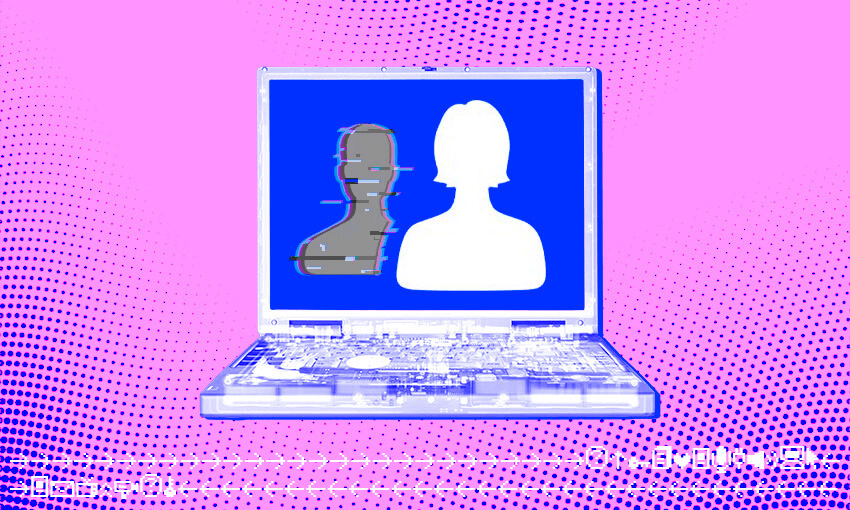A first person account of romantic intrigue, betrayal, and the mental health fallout that followed.
As told to Madeleine Holden for IRL.
I was late to the game when it came to joining Facebook. It was 2015 when I reluctantly signed up for an account, and a few months later, I was surprised to receive a friend request from a total stranger. Unsure whether this was normal on the platform, I showed a coworker and asked if she knew the man. She said, “No, but cool tattoo, eh?” I agreed, and accepted the request.
Soon after becoming Facebook friends, the man started messaging me, eventually revealing that he had romantic and sexual feelings for me. We began chatting on a daily basis, flirting, and after some persuasion on his part, exchanging erotic photos. The whole experience was a total novelty for me, and my feelings for him grew deeper and deeper. The man and I continued chatting online like this for eight or nine months.
On an otherwise nondescript night in 2016, the man wrote me a message that sent my heart pounding out of my chest: “You know who I am.”
Surely he meant that I’d come to know him intimately over the nine months we’d been talking? “No,” the man said, “you know who I am.”
So began an excruciating cat-and-mouse game, where the man exhorted me to guess who he was; a process of elimination as I guessed various names of people I knew. Eventually, I tried the name of a colleague I’d worked with for the past three years, before we were all recently made redundant. Bingo. It was him.
The realisation that I’d been unwittingly falling for a fake persona created by someone from my workplace made me feel sick. It was incomprehensible to me that someone could engage in that level of deception for so long; he’d gone to the trouble of concocting a fake name and finding fake profile pictures, and kept up the ruse for the better part of a year. The level of calculation and extent of the breach of trust made me feel nauseous. It was a total headfuck.
I couldn’t figure out why my catfish did what he did. He said it was because he had a crush on me, but when I told him I wasn’t interested in having a sexual relationship with him, he immediately became abusive, calling me the most horrible names. Hardly the actions of someone acting out of love.
I can honestly say that this experience destroyed years of my life. It’s hard to describe how it feels to be systematically targeted and groomed for months on end. The shock of the betrayal caused my mental health to spiral, which had knock-on effects in my life: I lost my driver’s licence because I was drinking to deal with the pain, and I lost friends and family members because they couldn’t understand the headspace I was in. My landlord kicked me out of my home, and I didn’t work for two years.
One day in my doctor’s office, I broke down crying and explained what had happened. My doctor sent me off to counseling, but the four sessions I qualified for weren’t enough to unravel what had happened, and why.
When I attempted to get justice and accountability after this incident, I was horrified to find no one could help me. I went to the police, Netsafe, a lawyer and the Human Rights Commission, and was repeatedly told this was a legal grey area the experts hadn’t really dealt with before. The police said I was essentially without legal remedy because I’d accepted the man’s friend request, and that it was up to Facebook to institute policies to curb catfishing. Apparently none of the laws against workplace sexual harassment or stalking could be applied to my situation.
The idea that what happened to me didn’t constitute sexual harassment in the workplace was especially baffling: my coworker initiated sexual conversations and sent nude images to me on work time, and often while we were in the same room together (as I later realised). But the police officer I spoke to told me “catfishing isn’t a crime.” It seems to me that catfishing is a new tool sexual predators can hide behind, and I wish the police would take that a lot more seriously than they appear to. Women deserve to feel safe and secure, whether that’s at home, in the workplace, or in public.
Social media has become such a big part of our lives these days, and we’re all told we should love it and spend lots of time on it. I want people to know that it can be a really seedy place, full of people willing to prey on the vulnerable. Stories like mine are often sensationalised and treated as fodder for TV shows, but there’s a devastating human cost that I want people to be aware of.
Most of all, I want legal remedies for people who went through what I did. It’s not good enough to be told we fall into a legal grey area; we need accountability and justice, just like the victims of other kinds of crimes. If we’re going to accept social media into our lives, we need to be sure it’s a safe place for all of us.
Have you deleted yourself off the internet? Were you an early viral star? Do you make your living in the gig economy? If you’ve got a great story about how the internet impacted your day-to-day life, get in touch with us at irl@thespinoff.co.nz.
